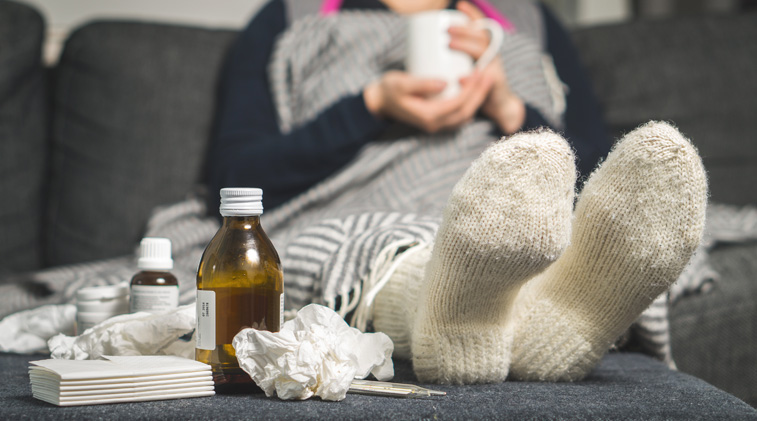What is Freshers’ Flu?
It doesn’t matter if it’s your first year or final year, freshers flu catches us all. Freshers’ flu is the dreaded ‘lurgy’ that most students get in the first few weeks of term. Freshers’ flu isn’t one ‘disease’ and can manifest itself in any number of ways depending on ‘what’s going around’. This might be the flu, or cold like symptoms or if you’re really unlucky some serious vomiting and diarrhoea… well, that’s not induced by normal fresher’s week festivities.
What Causes Freshers’ Flu?
It’s probably not rocket science to figure out that bringing large amounts of people from all over the place to live, work and party in confined spaces is going to be a recipe for bringing in bugs and transmitting them easily.
Even for the most well-prepared immune system, the combination of consistent exposure to a vast number or bugs, lack of sleep and less than ideal nutrition is a recipe for the body to ‘crash’ and pick up any illnesses going around, and if you’re really unlucky, this can sometimes take a few weeks to fully recover from, especially if you are invaded by a few different nasties at the same time.
However, no matter how futile it might seem that you will inevitably pick up some form of illness whilst your immune system toughens up (and you get back to some normal eating and sleeping patterns), there are ways to potentially prevent and at the very least limit the extent and duration of the dreaded freshers’ flu.
How to Prevent Freshers’ Flu on a Budget.
Although it might seem like a battle you can’t win, there are a few things we can do to help prevent freshers’ flu, or at least take the edge off if we do get it!
Working Out
Although working out does cause short term stress which can put ‘pressure’ on our immune system (so working out hard when ill isn’t a good idea), the long-term effects of exercise are to promote overall health and immune function.
There is also some evidence to suggest that working out when ill, at least gently, might help shorten the duration of illness. However, if you are ill our advice is to stay out the gym, have a bit of courtesy and stop potentially spreading your diseases to other poor unsuspecting people!
Diet
Ok, this is a biggie, and although even the healthiest of eaters might pick up the odd bug, a diet rich in immune boosting vitamins and minerals is always going to give you the best chance of preventing and reducing the impact of fresher’s flu.
This means plenty of fresh fruit and vegetables to get in your vitamin C and other immune boosting nutrients, lots of good fats (especially those found in nuts, seeds and oily fish which are rich in antioxidants) and lean sources of protein to help support recovery if you do get poorly.
Although fresh fruit and vegetables may be expensive, frozen and tinned varieties can more than do the job. However, for those who really do struggle to eat enough of the good stuff, there are always supplements that can give you a helping hand.
Supplements
Multi-Vitamin and mineral supplements can certainly fill the gap if required, however whole foods do tend to have added extras like fibre which help promote overall health including supporting immune system function, so whole grains and other fibrous foods should not be neglected.
Vitamin C is the most ‘famous’ vitamin when it comes to preventing cold, flu and other bugs. It certainly plays a big role in immune system function as an antioxidant but unfortunately using mega-doses of vitamin c might not be mega-effective at preventing illness.
However, we shouldn’t write a high dose of vitamin C off just yet. High doses may not prevent freshers’ flu, but it may well help reduce the duration and severity. So, increasing your vitamin C intake to 2000mg a day over your first few weeks of term might work, and it’s worth a try as it’s not exactly going to break the bank even on the tightest of student budgets.
Stress Levels
Stress is a bit of an ‘odd one’ when it comes to the immune system. It can in the short term boost our defences, but too much stress and these barriers are easily breached, especially when it comes in combination with a lack of sleep, poor nutrition and alcohol.
The best way to handle stress is through not going too ‘big’ in freshers’ week and looking after your nutrition, sleep and regular exercise so that the impact of any stress associated with starting at university is reduced and our ‘stress cup’ never gets to the point where it overflows and makes you more susceptible to illness.
Several supplements can also help, these include tyrosine and gingko biloba, which has some other interesting properties that may help us in promoting restful sleep.
Alcohol
Alcohol is a toxin and as such places stress on the body, there’s no real way of sugar coating that fact. Although drinking, and often drinking to excess, is standard behaviour for many people during freshers’ week, it will inevitably catch up with you.
You can however limit the damage by making sure that you stay adequately hydrated and try to make sure that drinking is limited to reasonable amounts… the more you drink, the longer it takes to clear your system and the worse you feel.
On top of this, alcohol impairs aspects of our metabolism that impair recovery and energy metabolism, both of which impact on exercise performance and immune system function. If you want to get the most out of exercise/sports at uni, then drinking more than moderate amounts a week is only going to severely hurt your gains as well as your liver.
Sleep Issues
We’ve already touched upon sleep in a few points above, however aside from not staying out partying late, there is are also ways that we can promote better quality sleep.
Firstly, better sleep habits when you do get an early night… no phones/electronics in bed and get your room as dark as possible.
Secondly, buy some decent ear plugs… your neighbours won’t care if you want to sleep, no matter how much you might protest, so take evasive action and save those late-night arguments and fall outs with flatmates/neighbours.
Last but not least, supplements that help you relax and promote more restful sleep might help, so although sleep may be scarce at times, you can get the most out the sleep you do get!
















